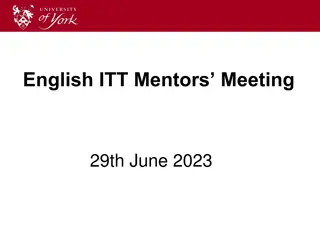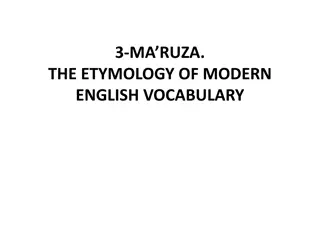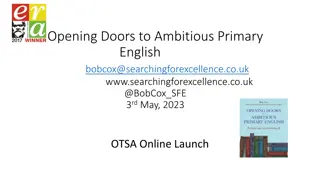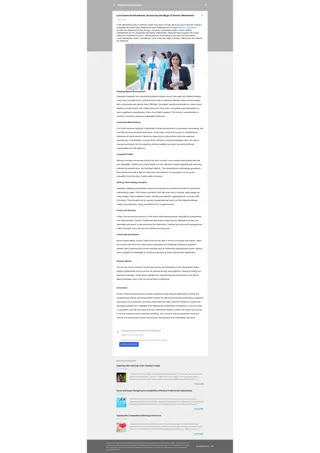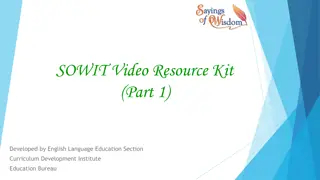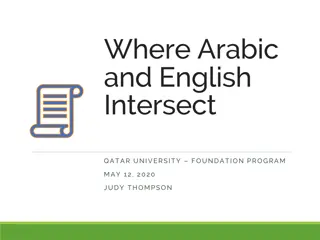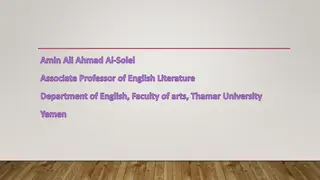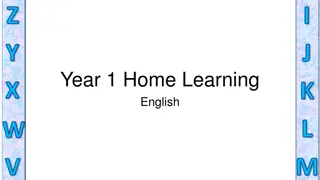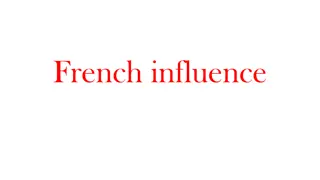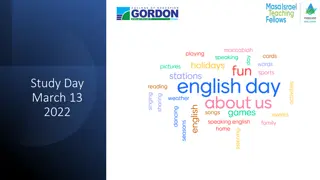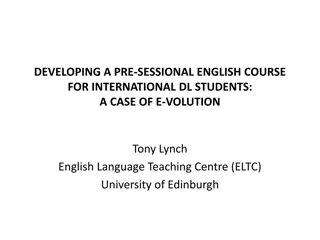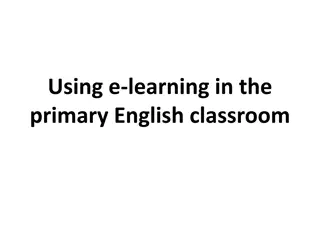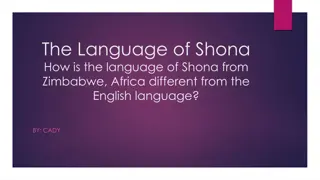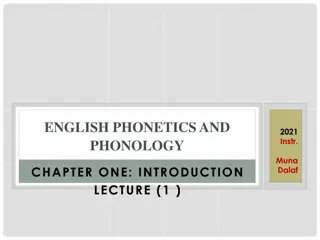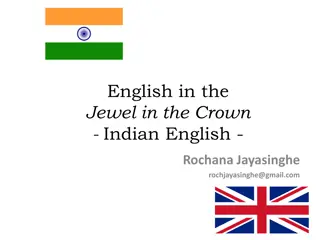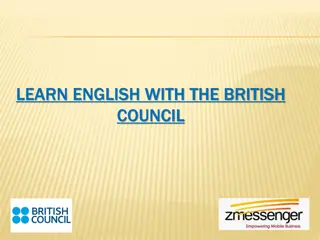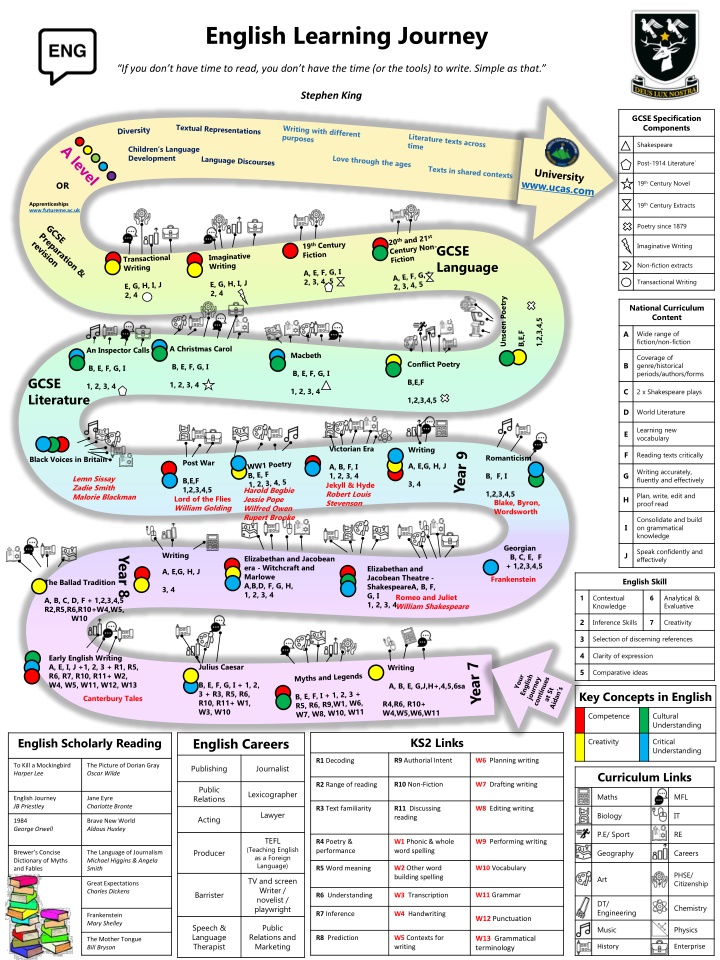
Crafting the English Learning Journey: A Comprehensive Curriculum Approach
Explore the meticulously designed English Learning Journey at St. Aidan's Catholic Academy, integrating chronological historical context, linguistic development, and grammatical understanding within a rich literature curriculum. Uncover the transformative power of literature education in equipping pupils with vital literacy skills and fostering a deep appreciation for English literature's societal impact.
Download Presentation

Please find below an Image/Link to download the presentation.
The content on the website is provided AS IS for your information and personal use only. It may not be sold, licensed, or shared on other websites without obtaining consent from the author. If you encounter any issues during the download, it is possible that the publisher has removed the file from their server.
You are allowed to download the files provided on this website for personal or commercial use, subject to the condition that they are used lawfully. All files are the property of their respective owners.
The content on the website is provided AS IS for your information and personal use only. It may not be sold, licensed, or shared on other websites without obtaining consent from the author.
E N D
Presentation Transcript
English Learning Journey If you don t have time to read, you don t have the time (or the tools) to write. Simple as that. Stephen King GCSE Specification Components Shakespeare Children s Language Development Post-1914 Literature` 19th Century Novel OR Apprenticeships www.futureme.ac.uk 19th Century Extracts Poetry since 1879 GCSE Language Imaginative Writing Non-fiction extracts Transactional Writing Unseen Poetry National Curriculum Content 1,2,3,4,5 A Wide range of fiction/non-fiction B,E,F A Christmas Carol An Inspector Calls Macbeth Coverage of genre/historical periods/authors/forms Conflict Poetry B B, E, F, G, I B, E, F, G, I B, E, F, G, I GCSE Literature B,E,F 1, 2, 3, 4 1, 2, 3, 4 1, 2, 3, 4 C 2 x Shakespeare plays 1,2,3,4,5 D World Literature Learning new vocabulary E Victorian Era Writing A, E,G, H, J F Reading texts critically Romanticism Black Voices in Britain Post War A, B, F, I 1, 2, 3, 4 Jekyll & Hyde Robert Louis Stevenson Writing accurately, fluently and effectively B, F, I G Lemn Sissay Zadie Smith Malorie Blackman B,E,F 1,2,3,4,5 Lord of the Flies William Golding 3, 4 Harold Begbie Jessie Pope Wilfred Owen Rupert Brooke 1,2,3,4,5 Blake, Byron, Wordsworth Plan, write, edit and proof read H Consolidate and build on grammatical knowledge I Georgian B, C, E, F + 1,2,3,4,5 Frankenstein Speak confidently and effectively Writing A, E,G, H, J J Elizabethan and Jacobean era - Witchcraft and Marlowe A,B,D, F, G, H, 1, 2, 3, 4 Year 8 Elizabethan and Jacobean Theatre - ShakespeareA, B, F, G, I 1, 2, 3, 4 William Shakespeare English Skill The Ballad Tradition 3, 4 Romeo and Juliet 1 Contextual Knowledge 6 Analytical & Evaluative A, B, C, D, F + 1,2,3,4,5 R2,R5,R6,R10+W4,W5, W10 2 Inference Skills 7 Creativity 3 Selection of discerning references 4 Clarity of expression Early English Writing A, E, I, J +1, 2, 3 + R1, R5, R6, R7, R10, R11+ W2, W4, W5, W11, W12, W13 Canterbury Tales Julius Caesar Writing 5 Comparative ideas A, B, E, G,J,H+,4,5,6sa B, E, F, G, I + 1, 2, 3 + R3, R5, R6, R10, R11+ W1, W3, W10 Key Concepts in English R4,R6, R10+ W4,W5,W6,W11 Competence Cultural Understanding English Careers KS2 Links English Scholarly Reading Creativity Critical Understanding R9 Authorial Intent W6 Planning writing R1 Decoding To Kill a Mockingbird Harper Lee The Picture of Dorian Gray Oscar Wilde Publishing Journalist Curriculum Links R10 Non-Fiction W7 Drafting writing R2 Range of reading Public Relations Lexicographer Maths MFL English Journey JB Priestley Jane Eyre Charlotte Bronte R11 Discussing reading W8 Editing writing R3 Text familiarity Lawyer Biology IT Acting 1984 George Orwell Brave New World Aldous Huxley P.E/ Sport RE TEFL R4 Poetry & performance W1 Phonic & whole word spelling W9 Performing writing (Teaching English as a Foreign Language) Producer Geography Careers Brewer s Concise Dictionary of Myths and Fables The Language of Journalism Michael Higgins & Angela Smith W2 Other word building spelling W10 Vocabulary R5 Word meaning PHSE/ Citizenship Art TV and screen Writer / novelist / playwright Great Expectations Charles Dickens Barrister W11 Grammar R6 Understanding W3 Transcription DT/ Engineering Chemistry R7 Inference W4 Handwriting Frankenstein Mary Shelley W12 Punctuation Speech & Language Therapist Public Music Physics Relations and Marketing R8 Prediction W5 Contexts for writing W13 Grammatical terminology The Mother Tongue Bill Bryson History Enterprise
English Learning Journey If you don t have time to read, you don t have the time (or the tools) to write. Simple as that. Stephen King The English Learning Journey at St Aidan s Catholic Academy is meticulously designed to build upon pupils primary experience taking them on a seven-year journey through the landscape of English Literature. It stands as a model of how to integrate chronological historical context, linguistic development, and grammatical understanding within a literature curriculum. Our curriculum aims not only to cover a wide spectrum of genres, historical periods, authors, and forms as mandated by the National Curriculum but also to delve deeper into the evolution of literature and its role in mirroring and shaping societal changes over time. Our curriculum is reflective of a belief in the transformative power of literature education to equip pupils with the literacy skills necessary for full participation in society, while also fostering a deep appreciation for the richness of English literature and its capacity to explain, reflect, and influence the world. As a member of the Bishop Chadwick Catholic Education Trust, we work closely with our Primary School partners to ensure curriculum continuity. Consequently, we believe our curriculum allows pupils to make outstanding progress in the four domains: literary studies; complex composition; grammar and linguistics; and the art of rhetoric. From the outset in Year 7, the curriculum establishes a foundation for the four domains by focusing on the transition from primary to secondary education, emphasizing creative writing, understanding of grammar and linguistics, and the exploration of whole books, short stories, poems and plays. Pupils also develop their understanding of writing through the study of rhetoric according to Aristotle and the pillars of Pathos, Ethos and Logos. To apply these concepts practically, pupils engage in oracy-based activities where they practice persuasive speaking, employing Aristotle's rhetorical strategies in debates and presentations. These activities not only reinforce their understanding of rhetoric but also improve their ability to speak persuasively and listen critically, a skill which is developed throughout their journey with us. From this ancient Greek context, pupils explore the classical civilisations further through a creative lens, studying William Shakespeare s portrayal of life in ancient Rome with his play, Julius Caesar . The Year 8 curriculum skilfully integrates progress in composition with a historical and literary lens, focusing initially on stylistic techniques and writing intent. It starts with the Elizabethan and Jacobean eras, examining witchcraft, superstition, and religion through the Pendle Witch Trials and Christopher Marlowe's "The Tragical History of Dr Faustus," before moving to Shakespeare s "Romeo and Juliet." To deepen oracy skills, pupils participate in dramatic readings and perform selected scenes from the play, focusing on the powerful use of language. These performances offer practical experience in employing rhetorical techniques in speech, enhancing their appreciation for Shakespeare's mastery of oracy and rhetoric. The journey continues into the Georgian era, spotlighting the Industrial Revolution's impacts and the emergence of Romantic poetry, culminating in a study of Mary Shelley s "Frankenstein" to discuss the tensions between science, nature, and religion. This comprehensive approach not only aids pupil progress in writing and analytical skills but also deepens their understanding of literature's cultural and historical underpinnings, preparing them for more nuanced literary critique and appreciation. These foundations set the stage for a chronological journey that seamlessly integrates historical context with the study of literature, ranging from ancient civilizations through to modern minority voices in Year 9, offering a broad and diverse perspective on the literary canon. Year 9's curriculum starts with enhancing skills in complex composition, creative writing, and transactional writing, alongside studying dystopian literature. It then delves into the intersection of science and societal concerns through "The Strange Case of Dr Jekyll and Mr Hyde", reflecting on Victorian era insights. Our curriculum progresses to World War 1, focusing on the emotions and thoughts of soldiers through the works of poets like Owen, Sassoon, and Sorley. The post- WW1 era is explored through William Golding's "Lord of the Flies", examining his wartime experiences and views on humanity's inherent darkness. The journey through Key Stage 3 concludes with modern minority voices, featuring works by Akala, Malorie Blackman, Benjamin Zephaniah, Caleb Femi, and Jackie Kay, covering a range of poems, prose, and social philosophy. Years 10 and 11 build on this foundation with a focused preparation for GCSEs, where pupils critically examine key texts across both English Literature and Language components, emphasizing the application of skills in creative and transactional writing, as well as the critical analysis of literature. Moreover, to strengthen oracy development, pupils are encouraged to engage in collaborative discussions that explore the themes, characters, and historical contexts of the texts studied. The curriculum supports the development of constructive listening and critical thinking skills, as pupils learn to evaluate their peers' contributions and provide thoughtful feedback. The curriculum s pinnacle is reached in Years 12 and 13, where pupils, now equipped with a robust foundation from KS3 and KS4, delve into A-Level studies with confidence. The A-Level curriculum expands on previous years by exploring a wider range of literary theorists and ideologies, further broadening pupils understanding of the English language and its continuous evolution influenced by cultural and technological factors. St. Aidan s approach exemplifies the integration of the National Curriculum ensuring pupils not only develop the essential skills of reading, writing, and critical analysis but also gain a comprehensive understanding of the historical, cultural, and social contexts that shape literature.
English Assessment Map: English Assessment Map: Year /Cycle Sub Curriculum assessed: Assessment Type Concept: Transactional Writing (a speech on the value of resilience, with an awareness of purpose, audience and form). Descriptive Writing: Myths and Legends/Epic Hero genre, (using simile, metaphor, personification, sensory language and accurate punctuation). Writing Like a Writer - Narrative Writing: Myths and Legends/Epic Hero genre, (using traditional hero s journey as a narrative structure incorporating dialogue and pathetic fallacy). Formative Formative Writing Year 7 Cycle 1 Extended Writing Language Analysis of Prometheus (writing in WWWETO paragraphs using subject specific terminology to identify techniques used). Summative Myths and Legends Writing Like a Critic exploring the theme of power in Literature beginning with Myths and Legends and exploring any other literature that pupils have read in the St. Aidan s reading cannon or at KS2. Linguistic Analysis of Julius Caesar (writing in WWWETO paragraphs, using subject specific terminology to identify techniques used). Focus on the character of Brutus before the assassination. Writing Like a Critic exploring the theme of Persuasion beginning with Act 1 and Act 2 of Julius Caesar and exploring any other literature that pupils have read in the St. Aidan s reading cannon or at KS2. Linguistic Analysis of Julius Caesar (writing in WWWETO paragraphs, using subject specific terminology to identify techniques used). Focus on the characters of Antony following the assassination. Linguistic Analysis of Julius Caesar (writing in WWWETO paragraphs, using subject specific terminology to identify techniques used). Focus on the characters of Cassius and Brutus following the assassination. Writing Like a Critic exploring the theme of Honour beginning with Julius Caesar and exploring any other literature that pupils have read in the St. Aidan s reading cannon or at KS2. Literary Analysis of the Pardoner s speech to the Pilgrims in The Canterbury Tales (writing in TEAR paragraphs using subject specific terminology to identify techniques used). Writing Like a Critic exploring theme of adventure in Literature beginning with The Canterbury Tales and exploring any other literature that pupils have read in their academic journey, St. Aidan s reading cannon or at KS2. Literary Analysis of an early English Ballad (writing in TEAR paragraphs using subject specific terminology to identify techniques used and comment on the form of the Ballad). Literary Analysis of an later English Ballad (writing in TEAR paragraphs using subject specific terminology to identify techniques used and comment on the form of the Ballad). Writing Like a Critic exploring theme of religion in Literature beginning with The Ballad Tradition and exploring any other literature that pupils have read in their academic journey, St. Aidan s reading cannon or at KS2. Extended Writing Formative Extended Writing Year 7 Cycle 2 Julius Caesar Formative Summative Extended Writing Formative The Canterbury Tales Extended Writing Year 7 Cycle 3 Formative The Ballad Tradition Summative
Transactional Writing (a newspaper article on a tragic event, with control of register, tone and style). Descriptive Writing: Tragedy genre, (using pathetic fallacy, foreshadowing and sentence structure for effect, particularly minor sentences). Writing Like a Writer - Narrative Writing: Tragedy genre, (creating a dilemma for the protagonist and engaging antagonists, developing understanding of narrative structure incorporating dialogue and motifs). Linguistic Analysis of The Hellion, (writing in WWWETO paragraphs, using subject specific terminology to identify techniques used). Writing Like a Critic exploring the theme of fear beginning with The Tragical History of Dr Faustus and exploring any other literature that pupils have read in their academic journey, St. Aidan s reading cannon or their own reading for pleasure. Linguistic Analysis of Romeo and Juliet, (writing in WWWETO paragraphs, using subject specific terminology to identify techniques used). Focused on the character of Romeo before he meets Juliet. Writing Like a Critic exploring the theme of conflict in literature, beginning with Romeo and Juliet and exploring any other literature that pupils have read in their academic journey, St. Aidan s reading cannon or their own reading for pleasure. Linguistic Evaluation of Frankenstein, (writing in WWWETO paragraphs, using subject specific terminology to identify techniques used). Focused on the early stages of the novel. Linguistic Evaluation of Frankenstein, (writing in WWWETO paragraphs, using subject specific terminology to identify techniques used). Focused on the middle stage of the novel. Writing Like a Critic exploring the theme of identity in literature, beginning with Frankenstein and exploring any other literature that pupils have read in their academic journey, St. Aidan s reading cannon or their own reading for pleasure. Literary evaluation of the presentation of a setting in Dr Frankenstein s journey (writing in TEAR paragraphs using subject specific terminology to identify techniques used). Writing Like a Critic exploring the theme of responsibility in literature, beginning with Frankenstein and exploring any other literature that pupils have read in their academic journey, St. Aidan s reading cannon or their own reading for pleasure. Literary Analysis of William Blake s London (writing in TEAR paragraphs with reference to language form and structure used to present Romantic attitudes towards the industrial revolution). Literary Analysis of William Wordsworth s Upon Westminster Bridge (writing in TEAR paragraphs with reference to language form and structure used to present Romantic attitudes towards the industrial revolution). Writing Like a Critic exploring the theme of nature in literature, beginning with the Romantic era and exploring any other literature that pupils have read in their academic journey, St. Aidan s reading cannon or their own reading for pleasure. Formative Formative Writing Extended Writing Year 8 Cycle 1 Elizabethan and Jacobean Era Witchcraft Summative Extended Writing Elizabethan and Jacobean Romeo and Juliet Formative Extended Writing Year 8 Cycle 2 Formative Georgian Era Frankenstei n Summative Extended Writing Formative Georgian Era Frankenstei n Extended Writing Formative Year 8 Cycle 3 Georgian Era - Romanticis m Formative Extended Writing
Transactional Writing (a letter to a local MP about issues in society which may grow to be a problem in the future, incorporating persuasive writing techniques to manipulate tone, style and register to suite purpose, audience and form. Descriptive Writing: Dystopian genre, (using semantic fields, evocative imagery, nuanced vocabulary and sentence structure for effect). Writing Like a Writer - Narrative Writing: Dystopian genre, (incorporating dystopian tropes and world building into narrative structure, introducing the role of the deuteragonist). Literary analysis of R L Stevenson s The Strange Case of Dr Jekyll and Mr Hyde, (writing in TEAR paragraphs, linking comments on the effect of the techniques identified to their opinions on the novella and authorial intent). Writing Like a Critic exploring the theme of conflict in literature, beginning with The Strange Case of Dr Jekyll and Mr Hyde and exploring any other literature that pupils have read in their academic journey, St. Aidan s reading cannon or their own reading for pleasure. Literary Analysis of WW1 poetry, (writing in TEAR paragraphs and incorporating contextual knowledge into analysis of language, form and structure). Writing Like A Critic exploring the theme of duty in literature, beginning with the war poets and exploring any other literature that pupils have read in their academic journey, St. Aidan s reading cannon or their own reading for pleasure. Literary Analysis of the first fire in Lord of the Flies, (writing in TEAR paragraphs and incorporating contextual knowledge into analysis of language, form and structure). Literary Analysis of Ralph s panic upon seeing the first ship in Lord of the Flies, (writing in TEAR paragraphs and incorporating contextual knowledge into analysis of language, form and structure). Writing Like A Critic exploring the theme of society in literature, beginning with Lord of the Flies and exploring any other literature that pupils have read in their academic journey, St. Aidan s reading cannon or their own reading for pleasure. Linguistic Evaluation of the aftermath of Simon s death in Lord of the Flies (writing in WWWETO paragraphs, using subject specific terminology to identify techniques used). Writing Like A Critic exploring the theme of evil in literature, beginning with Lord of the Flies and exploring any other literature that pupils have read in their academic journey, St. Aidan s reading cannon or their own reading for pleasure. Linguistic Evaluation of an unseen Benjamin Zephaniah poem, (writing in WWWETO paragraphs, using subject specific terminology to identify techniques used). Linguistic Comparison of fiction and non-fiction by Malorie Blackman, (writing in WWWETO paragraphs, comparing the presentation of ideas and perspectives). Writing Like A Critic exploring the theme of identity in literature, beginning with the war poets and exploring any other literature that pupils have read in their academic journey, St. Aidan s reading cannon or their own reading for pleasure. Formative Writing Formative Extended Writing Year 9 Cycle 1 Formative Victorian Era Extended Writing Formative War Poetry Extended Writing Year 9 Cycle 2 Formative Summative Post War- The Lord of the Flies Black Writing in Britain Extended Writing Formative Extended Writing Year 9 Cycle 3 Formative Black Voices in Britain Summative Extended Writing
Year /Cycle Sub Concept: Curriculum assessed: Assessment Type Literary Analysis of the character of Mr Birling in J.B. Priestley s An Inspector Calls, writing in TACAL paragraphs with reference to historical context, societal attitudes and authorial intent). Descriptive Writing writing an engaging setting using a range of literary and stylistic devices, nuanced vocabulary, a wide range of accurate punctuation and a range of sentence structure for effect. Literary Analysis of a theme in J.B. Priestley s An Inspector Calls, writing in TACAL paragraphs with reference to historical context, societal attitudes and authorial intent). Narrative Writing writing an engaging narrative with confident use of narrative structure, characterisation and dialogue as well as integrating stylistic devices, nuanced vocabulary, a wide range of accurate punctuation and a range of sentence structure for effect into the narrative Literary Analysis of an extract from Charles Dickens A Christmas Carol, writing in TEAR paragraphs, commenting on the effect of language, form and structure used to present a character. Transactional Writing Writing a persuasive text in an unseen form, on an unseen topic. Creating a well-structured persuasive discourse with appropriate use of stylistic and rhetorical devices to suite purpose, audience and form. Literary Analysis of a theme in Charles Dickens A Christmas Carol, writing in TACAL paragraphs with reference to authorial intent in order to explore significance of the theme. Transactional Writing Writing a persuasive text in an unseen form, on an unseen topic. Creating a well-structured persuasive discourse with appropriate use of stylistic and rhetorical devices to suite purpose, audience and form. Literary Analysis of an extract from William Shakespeare s Macbeth, writing in TEAR paragraphs, commenting on the effect of language, form and structure used to present a character. Linguistic Analysis of an unseen extract from 19th Century Fiction (prose), writing in WWWETO paragraphs commenting on the effect of language and structure. Literary Analysis of an extract from William Shakespeare s Macbeth, writing in TEAR paragraphs, commenting on the effect of language, form and structure used to present a character. Linguistic Analysis of an unseen extract from 21st Century Non-Fiction, writing in WWWETO paragraphs commenting on the effect of language and structure. Literary Analysis of a theme in William Shakespeare s Macbeth as a whole, writing in TACAL paragraphs with reference to historical context, societal attitudes and authorial intent). Linguistic Evaluation of an unseen extract from 19th Century Fiction (prose), writing in WWWETO paragraphs, commenting on the impact that settings, ideas, themes and events have and supporting with comments on how language creates/conveys them). Writing Like a Critic exploring the theme of villainy in literature, beginning with Macbeth and exploring any other literature that pupils have read in their academic journey, St. Aidan s reading cannon or their own reading for pleasure. Transactional Writing Writing a persuasive article drawing on research conducted through academic reading. Creating a well-structured persuasive discourse with appropriate use of stylistic and rhetorical devices to suite purpose, audience and form. Formative Literature: An Inspector Calls Language: Imaginative Writing Formative Year 10 Cycle 1 Summative Literature: A Christmas Carol Language: Transactional Writing Extended Writing Extended Writing Formative Literature: Macbeth Language: Analysis Formative Year 10 Cycle 2 Summative Literature: Macbeth Language: Evaluation Extended Writing
Analytical comparison of two unseen poems which share a common theme, writing in TEAR-c-TEAR paragraphs, commenting on the effect of language, form and structure used to present a common theme. Linguistic Comparison of unseen extracts from 20th and 21st Century non-fiction, writing in WWWETO paragraphs commenting on the presentation of ideas and perspectives. Analytical comparison of two poems from the Edexcel Power and Conflict Poetry Anthology, writing in TEAR-c-TEAR paragraphs, commenting on the effect of language, form and structure used to present the writer s viewpoint with reference to historical context, societal attitudes and authorial intent. Linguistic Comparison of unseen extracts from 20th and 21st Century non-fiction, writing in WWWETO paragraphs commenting on the presentation of ideas and perspectives. Analytical comparison of two modern poems, writing in TEAR-c- TEAR paragraphs, commenting on the effect of language, form and structure used to present the writer s viewpoint with reference to historical context, societal attitudes and authorial intent. Linguistic Analysis of an unseen extract from 21st Century Non- Fiction, writing in WWWETO paragraphs commenting on the effect of language and structure. Writing Like A Critic exploring the theme of conflict in the Edexcel Power and Conflict poetry anthology, writing in TACAL paragraphs, commenting the context of different poems and how the writers use language form and structure to express their views on different forms of conflict. Transactional Writing Writing a persuasive article drawing on research conducted through academic reading. Creating a well- structured persuasive discourse with appropriate use of stylistic and rhetorical devices to suite purpose, audience and form. Formative Literature: Poetry: Conflict Anthology Language: Comparison Formative Year 10 Cycle 3 Summative Literature: Unseen Poetry Language:20th and 21st Century Non-Fiction (reading) Extended Writing
Year /Cycle Sub Curriculum assessed: Assessment Type Concept: Literary Analysis of a the character of Sheila in J.B. Priestley s An Inspector Calls, writing in TACAL paragraphs with reference to historical context, societal attitudes and authorial intent). Linguistic Analysis of an unseen extract from 20th Century non-fiction, writing in WWWETO paragraphs commenting on how language and structure are used to interest and engage the reader. Linguistic Evaluation of an unseen extract from 19th Century Fiction (prose), writing in WWWETO paragraphs, commenting on the impact that settings, ideas, themes and events have and supporting with comments on how language creates/conveys them). Literary Analysis of a theme in J.B. Priestley s An Inspector Calls, writing in TACAL paragraphs with reference to historical context, societal attitudes and authorial intent). Linguistic Analysis of an unseen extract from 19th Century fiction (prose), writing in WWWETO paragraphs commenting on the effect of language and structure used to create effects and influence readers. Literary Analysis of a theme in Charles Dickens A Christmas Carol, writing in TACAL paragraphs with reference to authorial intent in order to explore significance of the theme. Transactional Writing Writing a persuasive text in an unseen form, on an unseen topic. Creating a well-structured persuasive discourse with appropriate use of stylistic and rhetorical devices to suite purpose, audience and form. Literary Analysis of an extract from William Shakespeare s Macbeth, writing in TEAR paragraphs, commenting on the effect of language, form and structure used to present a character. Descriptive Writing writing an engaging setting using a range of literary and stylistic devices, nuanced vocabulary, a wide range of accurate punctuation and a range of sentence structure for effect. Literary Analysis of an extract from William Shakespeare s Macebeth, writing in TEAR paragraphs, commenting on the effect of language, form and structure used to present a character. Narrative Writing writing an engaging narrative with confident use of narrative structure, characterisation and dialogue as well as integrating stylistic devices, nuanced vocabulary, a wide range of accurate punctuation and a range of sentence structure for effect into the narrative. Transactional Writing Writing a persuasive article drawing on research conducted through academic reading. Creating a well-structured persuasive discourse with appropriate use of stylistic and rhetorical devices to suite purpose, audience and form. Literary Analysis of a guilt in William Shakespeare s Macbeth, writing in TACAL paragraphs with reference to authorial intent in order to explore significance of the theme. Transactional Writing Writing a persuasive article drawing on research conducted through academic reading. Creating a well-structured persuasive discourse with appropriate use of stylistic and rhetorical devices to suite purpose, audience and form. Literature: An Inspector Calls Language: 20th and 21st Century Non-Fiction (reading) Formative Formative Year 11 Cycle 1 Summative Literature: A Christmas Carol Language: 19th Century Fiction (reading) Extended Writing Extended Writing Formative Literature: Macbeth Language: Imaginative Writing Formative Year 11 Cycle 2 Summative Literature: Macbeth Language: Transactiona l Writing Extended Writing
Linguistic Evaluation of an unseen extract from 19th Century Fiction (prose), writing in WWWETO paragraphs, commenting on the impact that settings, ideas, themes and events have and supporting with comments on how language creates/conveys them). Analytical comparison of two unseen poems which share a common theme, writing in TEAR-c-TEAR paragraphs, commenting on the effect of language, form and structure used to present the writer s viewpoint. Transactional Writing Writing a persuasive article drawing on research conducted through academic reading. Creating a well-structured persuasive discourse with appropriate use of stylistic and rhetorical devices to suite purpose, audience and form. Analytical comparison of two unseen poems which share a common theme, writing in TEAR-c-TEAR paragraphs, commenting on the effect of language, form and structure used to present the writer s viewpoint. Linguistic Analysis of an unseen extract from 19th Century Fiction (prose), writing in WWWETO paragraphs commenting on the effect of language and structure. Revision of Literature texts / Skills identified as an areas for development (Macbeth, An Inspector Calls or A Christmas Carol) (Close analysis and TEAR paragraphs or thematic/contextual analysis and TACAL paragraphs). Revision of Language genres and skills identified as an areas for development (19th Century fiction, 20th and 21st Century non fiction, Creative Writing or Transactional Writing) - (analysis, evaluation, summary or comparison). Formative Literature: Poetry: Conflict Anthology Language: Revision Formative Year 11 Cycle 3 Formative GCSE Exam period
A Level Summary of Assessment: Year 12 Cycle 1 Meanings and Representation Summative Assessment: How language used in the modern media, and 19th Century non-fiction is used to create meanings and representations and how contextual factors influence the choices/viewpoints of text producers). Language Discourses Summative Assessment: An evaluation of a statement made about an issue encountered the study of Accent and Dialect. Year 12 Cycle 2 Language and the Individual Summative Assessment: An evaluation of a statement made about the way that children acquire spoken language with a critical evaluation of the theories that support or refute the statement, referencing a transcript of a conversation between a child and a caregiver). Language Discourses Summative Assessment: An evaluation of a statement made about an issue encountered the study of Language and Gender. Year 12 Cycle 3 Language and the Individual Summative Assessment: An evaluation of a statement made about the way that children acquire literacy and written language with a critical evaluation of the theories that support or refute the statement, referencing a transcript of a conversation between a child and a caregiver). Language Discourses Summative Assessment: An evaluation of a statement made about an issue encountered the study of Language Change.
A Level Summary of Assessment: Year 13 Cycle 1 Language Discourses Summative Assessment: Writing an engaging opinion article on a topic encountered in the study of linguistics. Language Discourses Summative Assessment: An evaluation of a statement made about an issue encountered the study of Global English.


